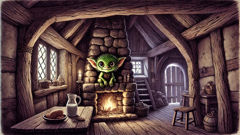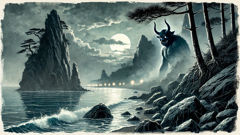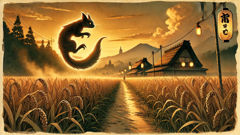Introduction
Beneath the rolling, pine-clad hills of the medieval Rhineland, in a land where the mists curled through ancient forests and the stones themselves seemed to remember secrets, whispers passed from hearth to hearth about the kobold. Neither wholly spirit nor wholly creature, the kobold dwelled at the threshold between worlds—one foot in the warm shadows of human dwellings, the other deep within the labyrinthine mines that honeycombed the earth. In the glow of crackling fires, children huddled close to their elders, spellbound by tales of invisible hands that swept up stray crumbs, hid trinkets, or sometimes, with a flash of temper, sent milk sour and tools missing. To some, the kobold was a protector—blessing the industrious and scaring off thieves with unseen pranks. To others, he was a trickster who punished pride and disrespect with uncanny misfortune. Yet all agreed on one thing: the kobold was as old as the stones, as wise as the night, and as capricious as a woodland wind. In the village of Eberswald, nestled between dense forest and the yawning mouth of the Eisenmund mine, the legend was not just told—it was lived. Every family left bread and milk on the hearth, every miner whispered a prayer before entering the tunnels. For they knew that the boundaries between the visible and invisible, the mundane and the magical, were thin as cobwebs, and the kobold watched from the corners, eyes glinting like mica in the dark.
The Hearth’s Secret: Linhardt’s Family and the Kobold’s Blessing
In Eberswald, life pulsed to the rhythm of seasons and superstition. For Linhardt, the youngest son of the iron miner Georg Bauer, tales of kobolds were as real as the morning frost on his boots. Their cottage, with its thick walls of wattle and daub, was a haven for stories. Grandmother Ilsa, whose sight was clouded but whose memory was sharp, swore she’d seen the kobold herself—a hunched, wiry figure darting beneath the kitchen bench, leaving muddy footprints but never a threat. “He’s as old as the mine, boy,” she’d mutter, stroking Linhardt’s flaxen hair. “Respect him, and he’ll respect you.”
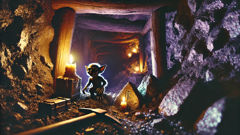
Linhardt, though, was not content with cautionary tales. Curious and clever, he left offerings of fresh rye bread and sweet cream on the hearth every new moon. Sometimes, he woke to find the bread gone, replaced by a single, gleaming pebble or a perfect feather. Other times, he noticed his wooden toys arranged in curious patterns, or a missing sock returned, folded neatly atop his pillow. To Linhardt, these were secret messages—a silent dialogue with the spirit whose presence was felt but rarely seen.
One icy winter’s evening, as the wind howled through the forest and the fire sputtered low, Georg returned from the Eisenmund mine pale and shaken. “There’s mischief in the tunnels,” he told his wife. “Tools moved, lamps snuffed out. Some men say it’s the kobold—angered by greed.” That night, Linhardt crept from his bed, drawn by a faint, silvery chuckle in the darkness. He glimpsed a shape—small, cloaked in shadow—curling near the embers. The kobold’s eyes caught the light, bright as polished agate. Linhardt held his breath, sensing not malice but watchfulness. The spirit tilted his head, as if weighing Linhardt’s heart.
Days turned to weeks, and Eberswald’s miners grew wary. Strange echoes haunted the lower galleries; a pickaxe vanished, only to reappear balanced atop a beam where no man could reach. Yet in Linhardt’s home, warmth lingered. His chores seemed to do themselves—wood stacked, water fetched. Still, his grandmother’s warnings echoed. “The kobold chooses his friends,” she’d say. “But cross him, and even your shadow may desert you.” Linhardt pondered her words, vowing to be worthy of the kobold’s regard.
The villagers debated the cause of the mine’s unrest. Some blamed newcomers, others blamed the phase of the moon. Only Linhardt wondered if the spirit was trying to say something. One dawn, while gathering kindling, he found a stone inscribed with runes—an ancient warning: "Greed blinds the wise.” That evening, he placed it on the mantel as an offering, hoping the kobold would understand that someone was listening.
Into the Eisenmund: Trials and Trickery in the Depths
As spring stirred the forest and thawed the icy brooks, Georg’s crew prepared to delve deeper into Eisenmund. Rumors of rich ore had reached Eberswald, tempting miners with dreams of fortune. The deeper they dug, the stranger the happenings became. Lanterns flickered out in still air, and echoing laughter—neither human nor wholly unkind—drifted through the stone corridors. Georg, though wary, dismissed the stories as nerves. But Linhardt could not ignore them; he felt the kobold’s gaze from every shadow.
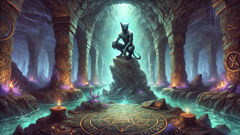
One evening, a shrill commotion erupted at the mine’s entrance. A valuable iron vein, newly discovered, had collapsed overnight, leaving rubble and confusion. The foreman blamed a careless worker; others murmured about the kobold’s wrath. Only Linhardt noticed a curious thing: where dust had settled, tiny footprints—too small for any man—wove a path from the blocked shaft to the sunlight outside. He knelt, tracing them with his finger, and felt a chill despite the spring air. He remembered the rune: “Greed blinds the wise.”
Linhardt’s sense of responsibility grew. After supper, he slipped away to the dark fringe of the forest, following the winding brook that ran past the mine. There, beneath an ancient oak whose roots grasped the earth like gnarled fingers, he left a token: his favorite wooden horse, carved by his grandfather. “Please,” he whispered into the twilight, “tell me what you want.” A gust rustled the leaves. For a moment, Linhardt thought he saw a face—wizened, wild, but not unkind—between the tree’s roots.
That night, his dreams were restless. He saw tunnels twisting endlessly below the village, lined with silver veins and flickering with blue-green light. At the heart of the mine, a chamber opened—a place both beautiful and forbidding. The kobold stood there, more ancient than time, speaking words that echoed in Linhardt’s bones: “Honor the earth. Take only what you need.” He awoke, heart pounding, the memory seared into his mind.
Over the following days, Linhardt shared his fears with his grandmother. Ilsa nodded gravely. “The kobold tests us when we forget gratitude. The mine is his home as much as ours. If we take without giving, all will be lost.” Inspired by her wisdom and his vision, Linhardt convinced Georg and several neighbors to leave gifts at the mine’s entrance—bread, salt, and a sprig of yew. Some scoffed, but others remembered old customs and followed his lead. That evening, a gentle breeze swept through the mine. The oppressive air lifted, and for the first time in weeks, the miners found their tools where they’d left them. In a narrow side passage, a bundle of wildflowers lay atop a mound of purest ore—a sign, they agreed, of the kobold’s approval.
The Feast of Shadows: Peril, Wisdom, and the Kobold’s True Test
As midsummer approached, Eberswald prepared for the annual Feast of Shadows—a festival said to appease both earthly ancestors and the spirits below. Villagers decorated their doors with mountain herbs and gathered by lantern-light to share stories and music. For Linhardt, the festival carried a deeper urgency. He sensed that the kobold’s patience was thinning; something in the air crackled with expectation.
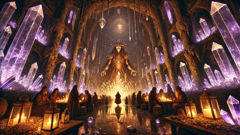
That night, as laughter echoed through the village square and bonfires blazed against the dusk, a stranger arrived—a merchant with sharp eyes and a heavy purse. He boasted of his wealth and scorned local customs, mocking the offerings left at hearth and mine alike. “Superstition,” he sneered. “There’s gold to be made if you dig deep enough.” Some villagers listened; a few grew restless, tempted by dreams of fortune.
Linhardt watched uneasily as the merchant entered the mine with a band of eager followers, ignoring all warnings. Hours passed. The bonfires burned low, and a hush fell as those who remained waited for their return. At last, a single figure stumbled from the darkness—ashen, trembling, his eyes wide with fear. “The tunnels changed,” he gasped. “Voices in the rock… shadows moving… We could not find our way.”
Word spread quickly. Georg and a rescue party, led by Linhardt, descended into the mine. At every fork, Linhardt listened for the faintest hint of laughter or song—the kobold’s calling card. Lamps flickered; the air turned cold. Suddenly, Linhardt heard a whisper—his name, spoken not aloud but inside his mind. He followed it to a narrow passage lit by an otherworldly glow.
There, in a chamber lined with quartz crystals, the kobold appeared—not as a mere trickster, but as a figure of solemn majesty. “You have honored your promise,” the spirit intoned, his voice echoing like water in stone. “But your people must choose: greed or gratitude.” With a wave of his hand, the walls shimmered, revealing visions of ruin and abundance—a village destroyed by unchecked hunger for wealth; another flourishing in harmony with earth and spirit.
Moved by the vision, Linhardt knelt and spoke from his heart: “We will take only what is given and give thanks in return.” The kobold’s eyes softened. “Wisdom grows where respect is sown,” he murmured. The path cleared, and the lost men—merchant included—were led out of the mine, shaken but unharmed. Back in the light, the merchant fled, his pride broken. Eberswald rejoiced, their faith in old wisdom renewed.
In the days that followed, life in Eberswald flourished. Crops grew thick; the mine yielded rich ore without collapse or curse. At every hearth, bread and milk awaited invisible hands. And sometimes, on quiet nights, Linhardt glimpsed a familiar figure near the dying fire—smiling, watchful, and forever guarding the threshold between worlds.
Conclusion
In the heart of Eberswald, the legend of the kobold lived on—woven into every chimney’s smoke, every miner’s whispered prayer, every loaf of bread left warm on a stone hearth. Linhardt grew into a wise man, respected by villagers and spirits alike. He taught his children—and all who would listen—that true prosperity came not from what was taken by force or cunning, but from what was earned through reverence and gratitude. The mine remained fruitful for generations, but never did Eberswald forget the lesson etched in rune and memory: respect for the unseen, for the delicate balance of earth and spirit.
As seasons turned and new faces arrived, some scoffed at old tales. Yet each year, on the eve of midsummer, Linhardt’s descendants gathered by candlelight to share the story anew. And sometimes—just sometimes—when the wind caught the eaves or a tool clinked softly in the night, they smiled, knowing the kobold was near. Not as a figure to be feared or placated with empty ritual, but as a guardian who demanded wisdom, humility, and a gentle heart.
So Eberswald prospered—not through gold alone, but through harmony with the world beneath their feet and the mysteries that shaped their lives. And though many tried to name or capture the kobold’s magic, none could—because true guardianship, like true wisdom, is always half-hidden in shadow.

